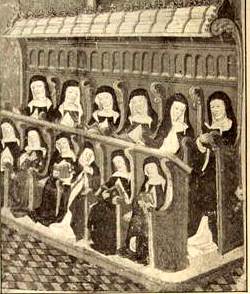Career choices for women
Because the option of going to a nunnery* was no longer open, there were few careers for women if they decided not to marry. A girl could train in a guild school to become a "dame" teacher, responsible for teaching young children how to read and write and young girls how to sew. If a middle class girl showed a talent in caring for the sick, she too could train at a guild school to go into the medical field as a nurse or midwife.
But by the end of the sixteenth century the religious and classical training of noble women had become unfashionable and their education became more concerned with lighter, more conversational material. The aim was to make women better companions for their husbands.
Under the circumstances it is surprising that any women became writers at all.
Wise words on women's education from a contemporary scholar.*
Footnotes
-
The closing of the nunneries
One outlet for creative or ambitious women in the Middle Ages was to become a nun: in the monastery she would not only learn to read and write, but could actually write books, or music, and so on. An unexpected side effect of the dissolution of the monasteries was the loss of this career for women.
-
"Sad sentences, prudent and chaste"
Juan Luis Vives, a Spanish humanist who came to England to tutor princess Mary in 1523, had this to say about the education of women:
I perceive that learned women be suspected of many, as who saith the subtlety of learning should be a nourishment for the maliciousness of their nature. Verily, I do not allow in a subtle and crafty woman such learning as should teach her deceit and teach her no good manners and virtues. . .
When she shall be taught to read, let those books be taken in hand that may teach good manners. And when she shall learn to write, let not her example be verses nor wanton or trifling songs but some sad sentences, prudent and chaste, taken out of holy scripture or the sayings of philosophers, which by often writing she may fasten better in her memory.
(The Instruction of a Christian Woman, 1523.)
